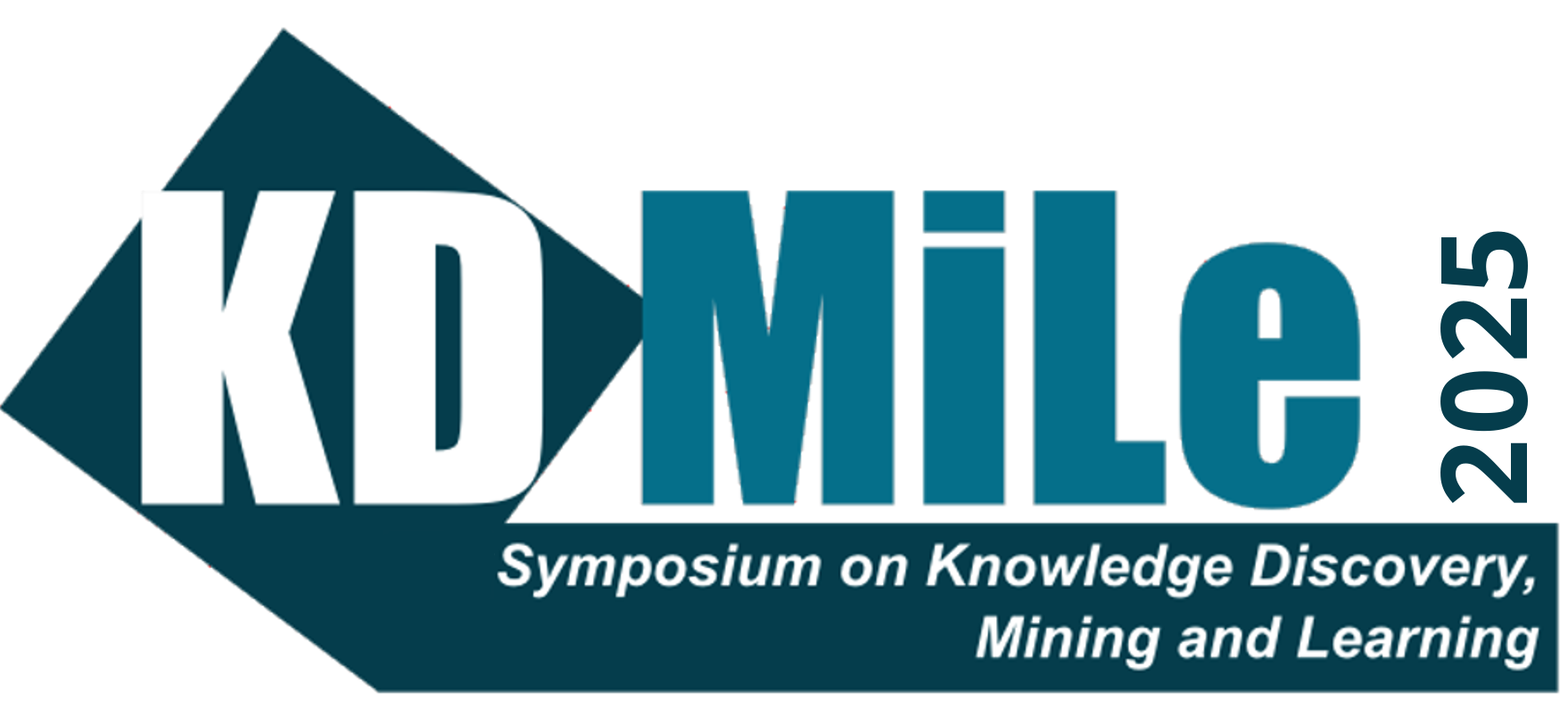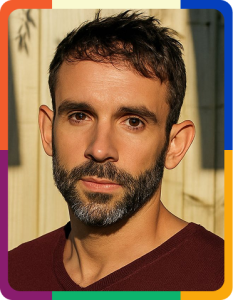KDMiLe 2025

The Symposium on Knowledge Discovery, Mining and Learning (KDMiLe) aims at integrating researchers, practitioners, developers, students, and users to present their research results, discuss ideas, and exchange techniques, tools, and practical experiences – related to the Data Mining and Machine Learning areas.
KDMiLe originated from WAAMD (Workshop em Algoritmos e Aplicações de Mineração de Dados) that occurred during five years – 2005 to 2009 – as a Workshop of the Brazilian Symposium on Databases (SBBD). Since 2013, KDMiLe has been organized alternatively in conjunction with the Brazilian Conference on Intelligent Systems (BRACIS) and the Brazilian Symposium on Databases (SBBD).
This year, 2025, in its thirteenth edition, KDMiLe will be held in Fortaleza, Ceará, from September 29 to October 2, in conjunction with the Brazilian Symposium on Databases (SBBD) and the Brazilian Conference on Intelligent Systems (BRACIS). This year KDMiLe is being organized by Federal University of Ceará.
SPEAKER
Isaac Triguero
University of Granada, Spain

Title
From Traditional AI to General Purpose Artificial Intelligence Systems: A Journey Towards Open-World Intelligence
Abstract
Most applications of Artificial Intelligence (AI) are designed for a confined and specific task. However, there are many scenarios that call for a more general AI, capable of solving a wide array of tasks without being specifically designed for them. The term General Purpose Artificial Intelligence Systems (GPAIS) has been defined to refer to these AI systems. To date, the possibility of an Artificial General Intelligence, powerful enough to perform any intellectual task as if it were human, or even improve it, has remained an aspiration, fiction, and considered a risk for our society. Whilst we might still be far from achieving that, GPAIS is a reality and sitting at the forefront of AI research.
In this talk, I will present a definition for GPAIS that allows for a gradual differentiation among types of GPAIS according to their properties and limitations. We will distinguish between closed-world and open-world GPAIS, characterising their degree of autonomy and ability based on several factors such as adaptation to new tasks, competence in domains not intentionally trained for, ability to learn from few data, or proactive acknowledgement of their own limitations. To walk you through the transition from traditional AI to GPAIS, I will start off talking about some interdisciplinary projects I have worked on, including big data applications in collaboration with industry partners such as Unilever and E.ON, spanning sectors like energy, transportation, and healthcare. I will then shift focus to my latest research on generalisable models that may help accelerate AI adoption. Finally, I will emphasise the critical need for responsible and trustworthy AI development as we navigate this evolving landscape.
IMPORTANT DATES
- Submission deadline:
May 30th, 2025June 15th, 2025
- Notification to authors:
July 7th, 2025July 23th, 2025
- Camera-ready version:
July 14th, 2025July 30th, 2025
SUBMISSION & PRESENTATION GUIDELINES
- Papers may be written in Portuguese or English, but the title, the abstract, and the keywords must be written in English.
- Submissions are reviewed following a single blind review process, i.e., you do not need to hide authors’ names and affiliations.
- The manuscript must not exceed 8 pages. Papers exceeding this limit will be automatically rejected without being reviewed by the Program Committee.
- Papers must be submitted in PDF format. Formats other than PDF will NOT be accepted.
- Latex template available here.
- Papers must be submitted through JEMS.
Papers submitted to KDMiLe must not have been simultaneously submitted to any other forum (conference or journal), nor should they have already been published elsewhere. The acceptance of a paper implies that at least one of its authors will register for the symposium to present it.
Submitted papers will be reviewed based on originality, relevance, technical soundness, and clarity of presentation. Accepted papers will be published electronically in the KDMiLe proceedings.
In all past editions, authors of selected papers accepted for presentation in KDMiLe have been invited to submit extended and revised versions of these papers to a special issue of JIDM (Journal of Information and Database Management). This year, we intend to follow this same policy of encouraging the best submissions with publication in an international journal.
TOPICS OF INTEREST
The KDMiLe Program Committee invites submissions containing new ideas, proposals, and applications in the Data Mining and Machine Learning areas. Below is a list of common topics, although KDMiLe is not limited to them.
In Data Mining:
- Association Rules
- Classification
- Clustering
- Data Mining Applications
- Data Mining Foundations
- Evaluation Methodology in Data Mining
- Feature Selection and Dimensionality
- Reduction
- Graph Mining
- Massive Data Mining
- Multimedia Data Mining
- Multirelational Mining
- Outlier Detection
- Parallel and Distributed Data Mining
- Pre and Post Processing
- Ranking and Preference Mining
- Privacy and Security in Data Mining
- Quality and Interest Metrics
- Sequential Patterns
- Social Network Mining
- Stream Data Mining
- Text Mining
- Time-Series Analysis
- Visual Data Mining
- Web Mining
- Recommender Systems based on Data Mining
In Machine Learning:
- Active Learning
- Bayesian Inference
- Case-Based Reasoning
- Cognitive Models of Learning
- Constructive Induction and Theory Revision
- Cost-Sensitive Learning
- Deep Learning
- Ensemble Methods
- Evaluation Methodology in Machine Learning
- Fuzzy Learning Systems
- Inductive Logic
- Kernel Methods
- Knowledge-Intensive Learning
- Learning Theory
- Machine Learning Applications
- Meta-Learning
- Multi-Agent and Co-Operative Learning
- Natural Language Processing
- Probabilistic and Statistical Methods
- Ranking and Preference Learning
- Recommender Systems based on Machine
- Learning
- Reinforcement Learning
- Semi-Supervised Learning
- Supervised Learning
- Unsupervised Learning
- Online Learning
- Data-Centric Artificial Intelligence
COMMITTEES
Steering committee
- Luiz Henrique de Campos Merschmann (UFLA)
- Alexandre Plastino (UFF)
- André Carlos Ponce de Leon Ferreira de Carvalho
- (ICMC-USP)
- Ricardo Cerri (ICMC-USP)
- Wagner Meira Jr. (UFMG)
Program chair
- Chair – Ronaldo Ribeiro Goldschmidt (IME-RJ) – ronaldo.rgold@ime.eb.br
- Co-Chair – Jorge de Abreu Soares (Cefet-RJ) – jorge.soares@cefet-rj.br
Program Committee
- Alan Valejo (Universidade de São Carlos)
- Alberto Sulaiman Sade Junior (Instituto Militar de Engenharia)
- Alessandro Vivas Andrade (Universidade Federal dos Vales Jequitinhonha e Mucuri)
- Alexandre Plastino (Universidade Federal Fluminense)
- Aline Paes (Universidade Federal Fluminense)
- Ana Carolina Lorena (Instituto Tecnológico de Aeronáutica)
- Argus Antonio Barbosa Cavalcante (IBM)
- Aurora Pozo (UFPR)
- Bianca Zadrozny (IBM Research)
- Bruno Nogueira (Universidade Federal de Mato Grosso do Sul)
- Carlos Ferrero (Instituto Federal de Santa Catarina)
- Carlos Eduardo Pantoja (CEFET/RJ)
- Carlos Eduardo Ribeiro de Mello (Unirio)
- Celso Camilo (Universidade Federal de Goiás)
- Claudia Justel (Instituto Militar de Engenharia)
- Daniel de Oliveira (Universidade Federal Fluminense)
- Daniel Mourão Martins (Instituto Militar de Engenharia)
- Danielo Gonçalves Gomes (Universidade Federal do Ceará)
- Dayse de Almeida (Universidade Federal de Catalão)
- Debora Medeiros (Universidade Federal do ABC)
- Diego Carvalho (CEFET/RJ)
- Diego Nunes Brandão (CEFET/RJ)
- Diego Furtado Silva (Universidade de São Paulo)
- Douglas de Oliveira Cardoso (Universidade de Coimbra)
- Edelberto Franco Silva (Universidade Federal de Juiz de Fora)
- Eduardo Bezerra (CEFET/RJ)
- Eduardo Evans Romanus (Grupo Ipiranga)
- Eduardo Ogasawara (CEFET/RJ)
- Elaine Cecília Gatto (Universidade Federal de Lavras)
- Elaine Sousa (University of Sao Paulo)
- Elloá Barreto Guedes da Costa (Universidade do Estado do Amazonas)
- Erick Florentino (TIM)
- Eugênio Silva (UERJ – Universidade do Estado do Rio de Janeiro)
- Fabio Lobato (Universidade Federal do Oeste Pará)
- Fabio Porto (LNCC)
- Fabrício Pereira (Universidade Federal do Estado do Rio de Janeiro)
- Fábio Cozman (USP – Politécnica)
- Fellipe Duarte (Universidade Federal Rural do Rio de Janeiro)
- Francisco de Carvalho (Centro de Informática – CIn/UFPE)
- Gabriel Machado (Pontifícia Universidade Católica do Rio de Janeiro)
- Georgia Regina Rodrigues Gomes (Universidade Federal Fluminense)
- Giomar Oliver Sequeiros Olivera (Universidade do Estado do Rio de Janeiro)
- Gustavo Paivia Guedes e Silva (CEFET/RJ)
- Gustavo Silva Semaan (Universidade Federal Fluminense)
- Heder Soares Bernardino (Universidade Federal de Juiz de Fora)
- Humberto Razente (Universidade Federal de Uberlândia)
- Jader Lugon Jr. (Instituto Federal Fluminense)
- Jonnathan Carvalho (Instituto Federal de Educação, Ciência e Tecnologia Fluminense)
- Joris Guerin (Université de Montpellier)
- Jorge de Abreu Soares (CEFET/RJ)
- José Luiz Neves Voltan (Instituto Militar de Engenharia)
- José André de Moura Brito (Instituto Brasileiro de Geografia e Estatística)
- Julio Duarte (Instituto Militar de Engenharia)
- Julio Nievola (PUCPR)
- Karin Becker (UFRGS)
- Karla Figueiredo (Universidade do Estado do Rio de Janeiro)
- Kate Revoredo (Humboldt-Universität zu Berlin)
- Leandro Alvim (Universidade Federal Rural do Rio de Janeiro)
- Leandro Miranda (Blueshift)
- Leonardo Emmendörfer (Universidade Federal de Santa Maria)
- Leonardo Tomazeli Duarte (University of Campinas)
- Leonardo F. R. Ribeiro (Amazon)
- Lincoln de Queiroz Vieira (Instituto Militar de Engenharia)
- Lincoln Faria da Silva (Universidade do Estado do Rio de Janeiro)
- Lucas Bastos Germano (Instituto Militar de Engenharia)
- Luciano Bertini (Universidade Federal de Itajubá)
- Luís Domingues Tomé Jardim Tarrataca (CEFET/RJ)
- Luis Zárate (Pontifícia Universidade Católica de Minas Gerais)
- Luiz Martins (Universidade Federal de Uberlândia)
- Luiz Henrique de Campos Merschmann (Universidade Federal de Lavras)
- Marcela Ribeiro (Universidade Federal de São Carlos)
- Marcelo Albertini (Federal University of Uberlândia)
- Marcelo Finger (USP/IME)
- Marcelo Manzato (University of Sao Paulo)
- Marcos Bedo (Universidade Federal Fluminense)
- Maria Camila Nardini Barioni (UFU)
- Maria Claudia Reis Cavalcanti (Instituto Militar de Engenharia)
- Mariza Ferro (Universidade Federal Fluminense)
- Maurício de Paulo (Instituto Militar de Engenharia)
- Mauri Ferrandin (Universidade Federal de Santa Catarina)
- Mário Benevides (Universidade Federal Fluminense)
- Murillo Carneiro (Federal University of Uberlândia)
- Murilo Loiola (Universidade Federal do ABC)
- Murilo Naldi (Universidade Federal de São Carlos)
- Nadia Felix Felipe da Silva (Universidade Federal de Goiás)
- Nuno David (ISCTE)
- Pablo Luiz Araújo Munhoz (Universidade Federal de Ouro Preto)
- Pablo Rangel (Instituto de Pesquisas da Marinha)
- Paulo Marcio Souza Freire (Fundação de Apoio à Escola Técnica do Estado do Rio de Janeiro)
- Paulo Quaresma (Universidade de Évora)
- Paulo Henrique Pisani (Universidade Federal do ABC)
- Paulo T. Guerra (Federal University of Ceará)
- Pedro Nuno de Souza Moura (Unirio)
- Priscila Lima (UFRJ)
- Rafael Gomes Mantovani (Federal Technology University of Paraná, Campus of Apucarana)
- Raphael Guerra (Universidade Federal Fluminense)
- Reginaldo Santos (Universidade Federal do Pará)
- Ricardo Cerri (Universidade de São Paulo)
- Ricardo Marcacini (ICMC/USP)
- Ricardo Rios (Universidade Federal da Bahia)
- Rodrigo Kishi (Universidade Federal de Mato Grosso do Sul)
- Ronaldo Prati (Universidade Federal do ABC)
- Ronaldo Ribeiro Goldschmidt (Instituto Militar de Engenharia)
- Roseli Ap. Francelin Romero (USP-SC)
- Samir de Oliveira Cunha Ramos (Instituto Militar de Engenharia)
- Sergio Teixeira Carvalho (Universidade Federal de Goiás)
- Sílvio Cazella (UFCSPA)
- Silvio Ereno Quincozes (Universidade Federal do Pampa)
- Stefano Suraci (Instituto Militar de Engenharia)
- Tanilson Dias dos Santos (Universidade Federal de Tocantins)
- Tatiane Nogueira (Federal University of Bahia)
- Tiago Tavares (Insper)
- Vasco Furtado (Universidade de Fortaleza)
- Wallace Corbo Ugulino (University of Twente)
- Wouter Caarls (PUC-Rio)
